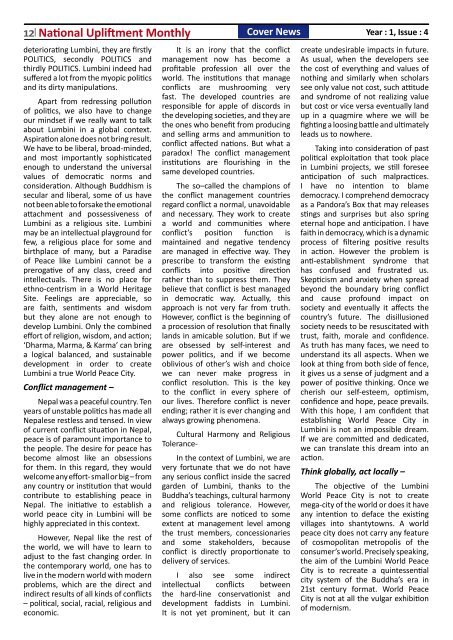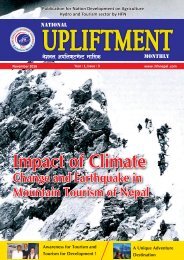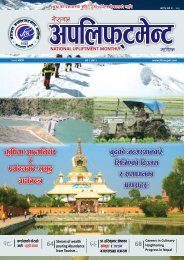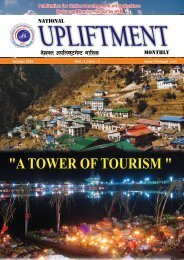You also want an ePaper? Increase the reach of your titles
YUMPU automatically turns print PDFs into web optimized ePapers that Google loves.
12<br />
<strong>National</strong> <strong>Upliftment</strong> <strong>Monthly</strong> Cover News<br />
Year : 1, Issue : 4<br />
deteriorating Lumbini, they are firstly<br />
POLITICS, secondly POLITICS and<br />
thirdly POLITICS. Lumbini indeed had<br />
suffered a lot from the myopic politics<br />
and its dirty manipulations.<br />
Apart from redressing pollution<br />
of politics, we also have to change<br />
our mindset if we really want to talk<br />
about Lumbini in a global context.<br />
Aspiration alone does not bring result.<br />
We have to be liberal, broad-minded,<br />
and most importantly sophisticated<br />
enough to understand the universal<br />
values of democratic norms and<br />
consideration. Although Buddhism is<br />
secular and liberal, some of us have<br />
not been able to forsake the emotional<br />
attachment and possessiveness of<br />
Lumbini as a religious site. Lumbini<br />
may be an intellectual playground for<br />
few, a religious place for some and<br />
birthplace of many, but a Paradise<br />
of Peace like Lumbini cannot be a<br />
prerogative of any class, creed and<br />
intellectuals. There is no place for<br />
ethno-centrism in a World Heritage<br />
Site. Feelings are appreciable, so<br />
are faith, sentiments and wisdom<br />
but they alone are not enough to<br />
develop Lumbini. Only the combined<br />
effort of religion, wisdom, and action;<br />
‘Dharma, Marma, & Karma’ can bring<br />
a logical balanced, and sustainable<br />
development in order to create<br />
Lumbini a true World Peace City.<br />
Conflict management –<br />
Nepal was a peaceful country. Ten<br />
years of unstable politics has made all<br />
Nepalese restless and tensed. In view<br />
of current conflict situation in Nepal,<br />
peace is of paramount importance to<br />
the people. The desire for peace has<br />
become almost like an obsessions<br />
for them. In this regard, they would<br />
welcome any effort- small or big – from<br />
any country or institution that would<br />
contribute to establishing peace in<br />
Nepal. The initiative to establish a<br />
world peace city in Lumbini will be<br />
highly appreciated in this context.<br />
However, Nepal like the rest of<br />
the world, we will have to learn to<br />
adjust to the fast changing order. In<br />
the contemporary world, one has to<br />
live in the modern world with modern<br />
problems, which are the direct and<br />
indirect results of all kinds of conflicts<br />
– political, social, racial, religious and<br />
economic.<br />
It is an irony that the conflict<br />
management now has become a<br />
profitable profession all over the<br />
world. The institutions that manage<br />
conflicts are mushrooming very<br />
fast. The developed countries are<br />
responsible for apple of discords in<br />
the developing societies, and they are<br />
the ones who benefit from producing<br />
and selling arms and ammunition to<br />
conflict affected nations. But what a<br />
paradox! The conflict management<br />
institutions are flourishing in the<br />
same developed countries.<br />
The so–called the champions of<br />
the conflict management countries<br />
regard conflict a normal, unavoidable<br />
and necessary. They work to create<br />
a world and communities where<br />
conflict’s position function is<br />
maintained and negative tendency<br />
are managed in effective way. They<br />
prescribe to transform the existing<br />
conflicts into positive direction<br />
rather than to suppress them. They<br />
believe that conflict is best managed<br />
in democratic way. Actually, this<br />
approach is not very far from truth.<br />
However, conflict is the beginning of<br />
a procession of resolution that finally<br />
lands in amicable solution. But if we<br />
are obsessed by self-interest and<br />
power politics, and if we become<br />
oblivious of other’s wish and choice<br />
we can never make progress in<br />
conflict resolution. This is the key<br />
to the conflict in every sphere of<br />
our lives. Therefore conflict is never<br />
ending; rather it is ever changing and<br />
always growing phenomena.<br />
Cultural Harmony and Religious<br />
Tolerance-<br />
In the context of Lumbini, we are<br />
very fortunate that we do not have<br />
any serious conflict inside the sacred<br />
garden of Lumbini, thanks to the<br />
Buddha’s teachings, cultural harmony<br />
and religious tolerance. However,<br />
some conflicts are noticed to some<br />
extent at management level among<br />
the trust members, concessionaries<br />
and some stakeholders, because<br />
conflict is directly proportionate to<br />
delivery of services.<br />
I also see some indirect<br />
intellectual conflicts between<br />
the hard-line conservationist and<br />
development faddists in Lumbini.<br />
It is not yet prominent, but it can<br />
create undesirable impacts in future.<br />
As usual, when the developers see<br />
the cost of everything and values of<br />
nothing and similarly when scholars<br />
see only value not cost, such attitude<br />
and syndrome of not realizing value<br />
but cost or vice versa eventually land<br />
up in a quagmire where we will be<br />
fighting a loosing battle and ultimately<br />
leads us to nowhere.<br />
Taking into consideration of past<br />
political exploitation that took place<br />
in Lumbini projects, we still foresee<br />
anticipation of such malpractices.<br />
I have no intention to blame<br />
democracy. I comprehend democracy<br />
as a Pandora’s Box that may releases<br />
stings and surprises but also spring<br />
eternal hope and anticipation. I have<br />
faith in democracy, which is a dynamic<br />
process of filtering positive results<br />
in action. However the problem is<br />
anti-establishment syndrome that<br />
has confused and frustrated us.<br />
Skepticism and anxiety when spread<br />
beyond the boundary bring conflict<br />
and cause profound impact on<br />
society and eventually it affects the<br />
country’s future. The disillusioned<br />
society needs to be resuscitated with<br />
trust, faith, morale and confidence.<br />
As truth has many faces, we need to<br />
understand its all aspects. When we<br />
look at thing from both side of fence,<br />
it gives us a sense of judgment and a<br />
power of positive thinking. Once we<br />
cherish our self-esteem, optimism,<br />
confidence and hope, peace prevails.<br />
With this hope, I am confident that<br />
establishing World Peace City in<br />
Lumbini is not an impossible dream.<br />
If we are committed and dedicated,<br />
we can translate this dream into an<br />
action.<br />
Think globally, act locally –<br />
The objective of the Lumbini<br />
World Peace City is not to create<br />
mega-city of the world or does it have<br />
any intention to deface the existing<br />
villages into shantytowns. A world<br />
peace city does not carry any feature<br />
of cosmopolitan metropolis of the<br />
consumer’s world. Precisely speaking,<br />
the aim of the Lumbini World Peace<br />
City is to recreate a quintessential<br />
city system of the Buddha’s era in<br />
21st century format. World Peace<br />
City is not at all the vulgar exhibition<br />
of modernism.





